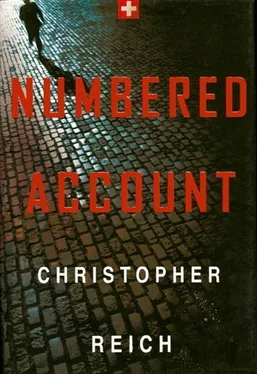“The future.”
“And?” Once more, Lina laid her head against his back.
He turned and pushed her arms to her sides. “Surely you know what it must bring.”
Lina met his eyes. He could see she thought his behavior odd. Her innocence was disarming. Almost.
“What?” she asked. “Do you know what it will bring?”
But Mevlevi was no longer listening. His ears were attuned to the staccato snap of Joseph’s footsteps, sounding from a distant hallway. He checked his watch, then walked out of the dining room and through the house to his office. “Do join us, Lina,” he called over his shoulder. “Your company would be most welcome.”
Mevlevi entered his study and brought himself face-to-face with his chief of security. Joseph stood at attention, eyes drilled to the fore. My proud desert hawk, thought Mevlevi.
Lina padded in a moment later and settled herself on the sofa.
“News?” Mevlevi asked Joseph.
“Everything is as according to plan. Sergeant Rodenko has two companies training on the south pitch. They are working with live grenades. Ivlov is giving a lecture on the deployment and detonation of antipersonnel claymore mines. Sentries report no activity.”
“All quiet on the western front,” said Mevlevi. “Very good.” He sidestepped the soldier and began pacing the room. He clutched the back of his chair, then straightened a few papers on his desk. He moved to the bookshelf, where he selected a novel, examined its cover, frowned, then replaced it. Finally, he placed himself directly behind Joseph. “Has your affection for me waned?” he asked.
Lina began to answer, but a quickly raised hand stopped her. He repeated the question, this time as a whisper in Joseph’s ear. “Has your affection for me waned? Answer me.”
“No, sir,” the desert hawk replied. “I love and respect you as I would my father.”
“Liar.” A sharp blow to the kidneys.
Joseph fell to one knee.
Mevlevi wrenched his ear and lifted him to his feet. “No father could be more ill served by a son. No man more disappointed. How could you fail me so? Once you would have given your life for me.” A finger traced the crooked scar that creased the hawk’s cheek. An open palm slapped the hawk’s face. “Would you still?”
“Yes, Al-Mevlevi. Always.”
A fist fired into the stomach.
Mevlevi glared at his retainer. “Stand up. You’re a soldier. Once you protected me. Saved me from a suicide raid by Mong’s killers. Once you were proud and hungry to serve. And now? Can you not defend me?”
Lina grabbed a pillow and clutched it to her chest.
Mevlevi placed his hands on the bodyguard’s shoulders. “Can you not save me from an asp in my household? One so close to my bosom?”
“I shall always do my best.”
“You will never betray me.”
“Never,” said the desert hawk.
Mevlevi grasped Joseph’s jaw with his right hand and with his left caressed his minion’s closely shorn hair. He kissed him on the lips—a hard, sexless embrace. “Yes, in my heart I know this. Now I know this.” He released him and walked with measured steps to the couch where Lina sat. “And you, cherie? When will you betray me?”
Wide-eyed, she stared at him.
“When?” Mevlevi whispered.
Lina jumped to her feet and ran past him into the hallway.
“Joseph,” the Pasha ordered. “Suleiman’s Pool!”
* * *
Fifty yards from Ali Mevlevi’s principal residence stood a low rectangular building, unremarkable in all aspects. Its cement walls had recently been whitewashed. Its terra-cotta roof was common to the region. Trellises laced with dormant bougainvillaea decorated its bland facade. A quick inspection, however, would yield several curious observations. No approach was cut from the manicured lawn surrounding the building. No door interrupted its plain exterior. Blackout curtains were drawn inside double-paned, soundproof windows permanently secured by a row of four-inch nails. But nothing was stranger or more inescapable than the odor that seeped from the house. It was an invasive smell that caused the eyes to water and the throat to burn. “An astringent or a cleanser?” one might ask. “A detoxicant?”
Not exactly. Just the nastiest bits of all three.
As he walked through the subterranean passageway, Ali Mevlevi kept his head bowed and his step pious. He wore a white dishdasha, thonged slippers, and an embroidered Muslim prayer cap, inlaid with pearls and golden thread. In his hand he carried the Koran. The holy book was opened to a prayer appropriate for the occasion—the Exaltation of Life—and he read aloud from it. After a single verse, he approached the end of the tiled passageway. His eyes began to tear—a natural reflex to the abrasive odor that stung his nasal passages—and he stopped reading. He dismissed his discomfort as necessary to further the work of almighty God, Allah, and climbed the concrete steps leading to the hall.
Before him lay Suleiman’s Pool: legacy of the greatest of Ottoman rulers, Suleiman the Magnificent. Thirty yards long and fifteen wide, the pool was filled with a brackish mixture of water, formaldehyde, and sodium triphosphate. For centuries, Turkish rulers had enjoyed preserving for months, even years, the youthful bodies of particularly treasured concubines. Somewhere during the twists and turns of history, the vagaries of corrupt Eastern rulers had turned from worship to torture, and from torture to murder. One was but a hop, skip, and jump from the other.
“Al-Mevlevi,” Lina shrieked upon seeing him enter the pavilion. “I beg you. You are mistaken. Please…”
Mevlevi guarded his devout pace and walked slowly to Lina, who was seated nude in a high-backed rattan chair. Her hands and feet were bound with sisal. He stroked her fine black hair. “Tsk, tsk, my child. No need to explain. You asked of your future. Behold it now.”
Mevlevi averted his gaze from Lina and looked at the pool. He could make out the outline of a dozen heads below the surface. Hair meandered from the corpses like undersea plant life on a tropical reef. He followed the bloated shapes downward to where bound feet were attached to dark oblong stones.
Lina gasped and began anew. “Al-Mevlevi, I do not work for the Makdisis. Yes, they brought me to the club. But I never spied on you. I never told them anything. I love you.”
Mevlevi laughed mirthlessly. He relegated his heart to a far corner of his soul. Devotion to a higher calling replaced it. “You love me? The Makdisis would be disappointed. I, though, am charmed. Should I believe you?”
“Yes, yes. You must.” Her tears stopped. She was pleading desperately for her life. Sincerity remained her sole currency.
“Tell me the truth, dear Lina. Only the truth. I must know everything.” Normally, Mevlevi enjoyed these last moments. The teasing and taunting. The luring of last hopes. But not today. He kissed her and found her lips hard and dry. He removed a handkerchief from his caftan and wiped the tears from her cheeks.
“Tell me the truth,” he said again, this time softly, as if lulling her to sleep.
“Yes, yes. I swear it.” Lina nodded her head furiously. “The Makdisis found me in Jounieh. They spoke first with my mother. They offered her much money. One thousand dollars American. My mother took me aside and told me of their offer. “What do such men wish me to do?’ I asked her. One of the Makdisis answered. He was a short, fat man with gray hair and very big eyes, eyes like oysters. ‘Lina, we want you only to look. To watch. To learn.’ ‘What am I to learn?’ I asked. ‘Just watch,’ he said. ‘We will contact you.’
“They wanted nothing specific?”
“No. Just for me to watch you.”
Читать дальше












